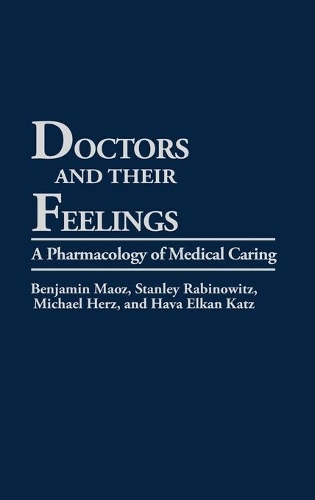
Doctors and Their Feelings: A Pharmacology of Medical Caring
(Hardback)
Publishing Details
Doctors and Their Feelings: A Pharmacology of Medical Caring
By (Author) Michael Herz
By (author) Eva Katz
By (author) Benjamin Maoz
By (author) Stanley Rabinowitz
Bloomsbury Publishing PLC
Praeger Publishers Inc
22nd July 1992
United States
Classifications
Tertiary Education
Non Fiction
610
Physical Properties
Hardback
168
Description
One of the most exciting medical developments during the past 30 years has been the rebirth of family medicine as a dynamic specialty. In the face of ever-widening definitions of health, the family physician has been challenged to integrate the physical, emotional, and social concepts of modern medicine into traditional medical service. Invariably in establishing a mutual understanding between doctor and patient, the doctor's emotions come into play. This text addresses the needs of family and other physicians to better understand their emotions, enhance their self-awareness, improve their communications skills, and apply these skills more effectively within the constraints of clinical practice and teaching. A multi-disciplinary approach common to the practice of family medicine is used. The authors come from a variety of disciplines - psychiatry, clinical psychology, family medicine, and family therapy.
Reviews
The book is important because it raises questions that demand attention if we are to continue as an effective profession. New burdens on the practice of medicine require heightened attention to the emotional lives of physicians; without it, we will have a bunch of disillusioned colleagues. Our work is too important to let this happen. Some might say that this is "soft" stuff and an inappropriate concern. Soft, yes. But it is important and real intellect is necessary to solve these difficulties. It is where we all live.-Annals of Internal Medicine
This book contains many useful reflections on the nature of family medicine. It provides an important contribution to the literature that attempts to understand the experience of being a family physician.-Canadian Family Physician
"This book contains many useful reflections on the nature of family medicine. It provides an important contribution to the literature that attempts to understand the experience of being a family physician."-Canadian Family Physician
"The book is important because it raises questions that demand attention if we are to continue as an effective profession. New burdens on the practice of medicine require heightened attention to the emotional lives of physicians; without it, we will have a bunch of disillusioned colleagues. Our work is too important to let this happen. Some might say that this is "soft" stuff and an inappropriate concern. Soft, yes. But it is important and real intellect is necessary to solve these difficulties. It is where we all live."-Annals of Internal Medicine
Author Bio
BENJAMIN MAOZ is Head of the Department of Psychiatry, Soroka Medical Centre, Ben Gurion University of the Negev, Israel. He is Visiting Professor to the Department of Family Medicine at the Sackler School of Medicine of Tel Aviv University. STANLEY RABINOWITZ previously was Head of the Medical Psychology unit of the Israel Defense Force Medical Corps and now holds academic appointments in the Department of Family Medicine in Tel Aviv University and the Center for Medical Education at Ben Gurion University. MICHAEL HERZ is a family physician in full-time pratice, holds an academic appointment in the Department of Family Medicine at the Sackler School of Medicine, and is the regional organizer of the Tel Aviv residency training program. HAVA ELKAN KATZ is a family therapist who is a senior therapist and supervisor in the Child and Family Clinic of the Kibbutz Clinic in Tel Aviv. She has held teaching posts in the Departments of Family Medicine in Tel Aviv and Beer Sheva.
